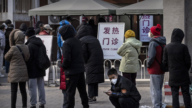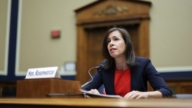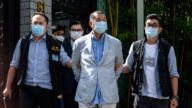【新唐人2011年4月16日讯】今年是辛亥革命100周年,由北京理工大学主办的辛亥革命100周年大学生辩论会,被有关部门叫停。有关人士认为,政府现在异常敏感,辩论会涉及“革命”两字,自然成了禁区。
今年是辛亥革命100周年,中共当局组织了多个与辛亥革命相关的主题活动,包括多部电影、电视剧、画展、摄影展、美术展等等。
虽然官方的宣传活动不少,但京津高校以“辛亥革命”为主题的辩论会,最近却被北京共青团市委取消。这次辩论会的主题是“三民主义”,参赛者包括北京大学、中国人民大学、天津大学等16所大学,并得到中国青年报、搜狐、网易等媒体支持。
担任评审的中国人民大学政治学教授张鸣对《纽约时报》表示,政府现在“担心所有的敏感主题”。他透露,“他们这样做确实伤害很大。辩论会的组织者说,他们试图谈判,但是市团委不肯改变决定。”
北京理工大学经济学教授胡星斗:“纪念辛亥革命一百周年这是中国政府早就认可的一个专案。也就是说,中国政府早在一两年前,就决定要隆重纪念辛亥革命。”
中国网络社区论坛上,有人对取消辩论表示不解和“郁闷”。 在《天涯论坛》上,有人写道:“现在维稳维得连辩论赛都取消,简直疯了。”
《美国之音》评论:“这似乎显示,在有关的北京市团委或者更高官员的心目中,‘革命’,即使是中共当局要纪念的,而将近100年前的辛亥革命,和‘大学生’、‘集会’、‘辩论’和‘三民主义’凑在一起,就成了不安定因素。中国的大学不是教授治校,而是中共党委党官治校,从这个事例来看,共青团团委团官也治校。”
旅美学者谢选骏:“中共实质上它是否定辛亥革命,但是口头上它不想否定,所以它还以辛亥革命的传人自居,但实际上这两个革命性质是完全相反。纪念辛亥革命确实有助于唤醒人民的革命意识,对中共来说是很不利的了。”
胡星斗教授希望有关纪念辛亥革命的活动可以继续举办,而且“三民主义”的理想,可以在中国继续实现。
北京理工大学经济学教授胡星斗:“一个国家的尊严,实际上主要还是靠‘民权和民生’这两方面来维护。如果不提倡民权,如果不改善民生,这个国家就没有尊严。所以‘民权和民生’也是目前中国所要戮力实行的。”
大陆网友吴先生认为,现在时机敏感气氛紧张,任何与“革命、民主”相关的议题,都会触碰当局敏感神经。他说:“他们(中共)现在听到‘革命’这两个字都快疯掉了。”
新唐人记者宋风、李若琳综合报导。
****************************
The 1911 Revolution Becomes a Taboo in China
This year is the 100th anniversary of 1911 Revolution.
Beijing Institute of Technology was to sponsor a debate
on the Revolution, but the authorities called for a stop.
Since the debate involved “revolution" and the authorities
are now very sensitive, it naturally became restricted.
This year is the 100th anniversary of the Revolution,
the Chinese authorities organized a number of activities
on the Revolution, including films, TV shows, exhibitions,
photography exhibition, art exhibitions and so on.
Although the authorities made quite a campaign,
the debate on the Revolution between Beijing and
Tianjin college students was, however, stopped by
the Beijing Communist Youth League Committee.
The theme of the debate was “3 People’s Principles."
Sixteen universities were to participate, including
Peking University, Renmin University, Tianjin Univ.
Sponsors include the Chinese Youth Daily, Sohu,
Netease and other media.
Professor Zhang Ming, served as a judge for the debate
from Remin University of China told NY Times,
the Government “worries about any sensitive topics."
“Debate organizers said they were trying to negotiate,
but the City Communist Youth League
would not change its decision. “
Hu Xingdou, economics professor at Beijing Institute
of Technology said, “Commemorating 1911 Revolution
has long been decided by the Chinese government.
About 2 years ago, the Chinese government already
decided to solemnly commemorate the Revolution. “
At the China’s online community forum, people felt
hard to understand the cancellation and felt “depressed."
In the “Tianya Forum “, one person wrote:
“Now to maintain the government’s stability,
even the debate is canceled, it is simply crazy. “
The VOA Commented: This seems to indicate that
in the eyes of Beijing Communist Youth League and
other high officials, anything relating to “revolution"
is what the Chinese authorities to commemorate.
Yet, when “Revolution” combined with “students,"
“assembly," “debate," and “Three People’s Principles",
it becomes a destabilizing factor.
In China, colleges are not run by professors,
but by the Communist Party and party officials.
Xie Xuanjun, a Chinese scholar living in America, said,
“The Communist Party is in fact denying the Revolution,
but does not want to verbally deny it. It still claims itself
the successor of the Revolution, but the revolutionary
nature of the two are completely opposite.
Commemorating the Revolution indeed helps awaken
people’s revolutionary awareness. “
Professor Hu hopes the commemoration activities
of the Revolution can continue, and the ideal of
“Three People’s Principles" can be realized in China.
Professor Hu: “The dignity of a nation, in fact,
mainly relies on the people’s livelihood and civil rights.
If you do not advocate civil rights, not improve people’s
livelihood, the country does not have dignity.
So implementing civil rights and people’s livelihood
in China is what we need to work most. “
Mainland internet user Mr. Wu thinks that
now at such a sensitive time and tension,
any topics relating to “revolution or democracy"
will touch the sensitive nerve of the authorities.
He said: “They get mad at hearing ‘Revolution’."
NTDTV reporters Song Feng and Li Ruolin





























